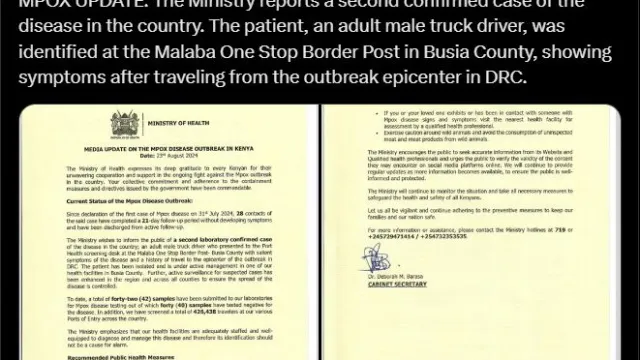FALSE: Mpox outbreak is not rising in Kenya due to Gen Z-led protests

FALSE: Mpox outbreak is not rising in Kenya due to Gen Z-led protests
Official statistics show that new cases are of people of various ages, but with a history of travel.
This post on X (formerly Twitter) claiming that Mpox cases in Kenya are on the increase among the young people following Gen Z-led protests is FALSE.
The post’s caption reads, “MPOX cases are on the rise among young people following MAANDAMANO protests. This underscores the need for safe practices and awareness. Don’t let ignorance spread faster than the disease.”
According to the World Health Organization (WHO), Mpox is an illness caused by the monkeypox virus. The viral disease is mainly spread through close contact, and occasionally from the environment to people via things and surfaces that have been touched by a person with Mpox.
Data from the Ministry of Health shows that all new Mpox cases in Kenya are of people of various ages, who have either traveled or have come into close contact with individuals with a recent history of travel regionally.
For example, the first case of Mpox in Kenya was reported on July 29 and the infected was a man, 42, who entered Kenya having crossed through Uganda and Rwanda. The second case involved an adult male truck driver, who had made his journey from the epicentre of the disease, the Democratic Republic of Congo (DRC).
Kenya’s third case involved a 30-year-old female, who equally reported travelling to Uganda, a country that has reported at least 10 Mpox cases so far.
The fourth case, reported on August 31 in Nakuru county, involved a truck driver who had travelled to Rwanda from Mombasa.
The fifth case was reported on September 4, involving a 29-year-old female from Mombasa, who had no travel history to a country reporting Mpox cases but was later identified as the spouse to the fourth case.
Thus overall, Kenya has reported five Mpox cases, with two patients, the second and third case, having fully recovered, according to the Ministry of Health.
In June, Kenya’s young generation, popularly known as Gen Z, took to the streets demanding the withdrawal of Finance Bill 2024, citing punitive tax measures. President William Ruto bowed to pressure and withdrew the contentious tax law.
However, the youth took to the streets again on August 8. Dubbed the ‘Nane Nane March’, it was a continuation of months-long anti-tax protests that had morphed into calls for the President to resign, especially after he re-appointed over half of his previous cabinet to power.
Notably, none of the Mpox cases have been associated by any credible health authorities to Gen Z-led protests that engulfed Kenya from June to August. AFP also debunked a similar claim and found it to be false.
Maudhui House examined a post on X purporting that Mpox cases are on the rise among the youth in Kenya and found it to be FALSE.
This fact-check was published by Muadhui House with support from Code for Africa’s PesaCheck and African Fact-Checking Alliance.



